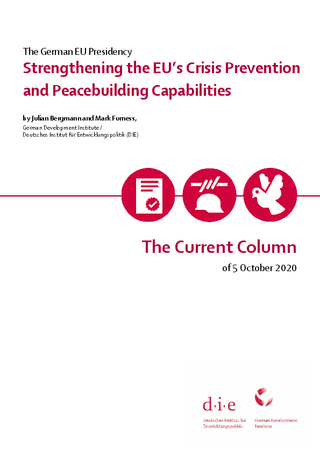The German EU Presidency
Strengthening the EU’s Crisis Prevention and Peacebuilding Capabilities
Bergmann, Julian / Mark FurnessThe Current Column (2020)
German Development Institute / Deutsches Institut für Entwicklungspolitik (DIE), The Current Column of 5 October 2020
Germany’s EU Council Presidency, which began on 1 July, has been marked by several political crises that have threatened peace in the ‘near abroad’. The massive explosion in Beirut’s port on 4 August was blamed on the country’s rotten political settlement and corrupt elites. Europe’s ‘last dictator’ has attempted to violently repress mass protests that erupted in the wake of Belarus’ fraudulent election on 9 August. The 18 August coup in Mali threatens further destabilisation of the country and the wider Sahel region.
Despite long-standing difficulties at the EU-level to forge a joint approach among 27 member states, the EU’s diplomatic response to the three crises has been relatively swift and clear in its message. In Lebanon, the political will for Europe to act appears to be available, following visits to Beirut by French President Macron (twice), European Council President Michel, and German Foreign Minister Maas in the wake of the port explosion. In addition to pledging funds for Beirut’s reconstruction, all three leaders clearly addressed the need to reform the country’s political system and offered Europe’s support. Regarding Belarus, EU leaders have unequivocally declared their solidarity with the people’s desire for fundamental democratic rights, and have endorsed OSCE proposals for mediating a national dialogue process. However, EU sanctions against the Belarussian regime were delayed for several weeks when Cyprus linked them to its long-running territorial dispute with Turkey. On Mali, the EU quickly condemned the coup as an inadequate response to the country’s deep socio-political conflict, suspended its training missions and backed mediation attempts by the Economic Community of West African States.
None of these crises came as a particular surprise, either to the people of Lebanon, Belarus or Mali who are caught up in them, or to seasoned observers of the three countries. All three have emerged from deep-rooted, long-running, unresolved political conflicts. In all three crisis contexts, however, the EU has a role to play in support the movements within the societies towards a more stable, peaceful and democratic future. In doing so, the EU needs to ensure that it is not stuck in crisis mode.
One aspect of the German EU Presidency programme that has not received much widespread attention is the ambition to strengthen the EU’s longer-term crisis prevention capacities, and its abilities to respond to protracted conflicts. Building on Germany’s own experience in adopting and implementing Federal Guidelines for Preventing Crises, Resolving Conflicts and Building Peace, the objective is to develop a European Consensus on Crisis Prevention and Peacebuilding. The intention is to embed the EU’s considerable resources and capacity-building activities in a broader crisis prevention and peacebuilding strategy. This should contribute to the successful implementation of the EU’s ‘integrated approach’ to external conflicts and crises.
This is a worthwhile endeavour, but should serve two purposes in particular. First, the process of producing a European Consensus should establish a broad normative agreement among EU member states, the Commission and the European Parliament about the key principles, instruments and partnerships in this domain. Adopting such a document would send a strong signal about the political priority the EU attaches to crisis prevention and peacebuilding, and thereby increase member states’ commitment when action is required. Second, a European Consensus could establish a much-needed overarching strategic framework for the multiple EU activities and instruments for crisis prevention, conflict management and peacebuilding. This becomes even more relevant in light of the ongoing negotiations about new financial instruments such as the European Peace Facility that would add military capacity building – including the provision of weapons and ammunition – to the EU’s foreign policy toolbox. Without a clear strategic framework that puts policy coherence for sustainable peace at the centre of the EU’s crisis prevention and peacebuilding activities, the EU will continue to struggle to provide a unified, effective response.
Clearly, the mere act of writing a new policy document will not make the EU more effective in responding to political crises and violent conflicts, both in its near abroad and further afield. The policy-level process needs to be backed by real political commitment. Although the EU’s leaders have shown signs of this with regard to Lebanon, Belarus and Mali, all of these crises will test the long-term commitment of the EU and its member states. Nevertheless, while the task of agreeing EU crisis prevention guidelines may seem as a relatively minor item in Germany’s Presidency programme, it is crucial for the EU’s credibility as an international actor, as a promoter of its own fundamental rights, values and interests, and as a force for peace globally.
This text is part of a special series in our format The Current Column, which classifies the EU Council Presidency in terms of development policy. You can find the other texts on our overview page.



